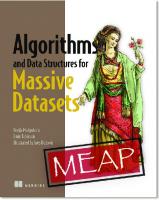Algorithms and Data Structures for Cloud Computing
Unleash the Power of Algorithms and Data Structures for Cloud Computing: A Comprehensive Guide Embark on a transformativ
166 49 1MB
English Pages 398 Year 2023
Table of contents :
Preface
Algorithms and Data Structures for Cloud Computing
Module 1: Introduction to Cloud Computing and Algorithmic Thinking
Module 1: Introduction to Cloud Computing and Algorithmic Thinking
Understanding Cloud Computing
Algorithmic Thinking
Cloud Computing and Scalability
Overview of Data Structures in Cloud Computing
Module 2: Fundamentals of Distributed Systems
Module 2: Fundamentals of Distributed Systems
Introduction to Distributed Systems
Communication in Distributed Systems
Fault Tolerance and Reliability
Distributed Algorithms
Module 3: Storage and Retrieval Algorithms in Cloud Databases
Module 3: Storage and Retrieval Algorithms in Cloud Databases
Cloud Database Basics
Distributed Storage Systems
Indexing and Searching in the Cloud
Case Studies and Best Practices
Module 4: Parallel and Distributed Computing
Module 4: Parallel and Distributed Computing
Parallel Computing Fundamentals
MapReduce and Beyond
Distributed Machine Learning
Performance Optimization and Monitoring
Module 5: Networking in Cloud Environments
Module 5: Networking in Cloud Environments
Basics of Networking in the Cloud
Network Protocols and Communication
Security in Cloud Networks
Software-Defined Networking (SDN)
Module 6: Cloud Storage Technologies
Module 6: Cloud Storage Technologies
Object Storage
Block Storage
Cloud Storage Security
Data Archival and Retrieval Strategies
Module 7: Load Balancing and Auto-Scaling
Module 7: Load Balancing and Auto-Scaling
Load Balancing Algorithms
Auto-Scaling Strategies
Elasticity in Cloud Environments
Performance Monitoring and Optimization
Module 8: Containerization and Orchestration
Module 8: Containerization and Orchestration
Introduction to Containers
Docker and Containerization
Kubernetes Orchestration
Microservices Architecture in the Cloud
Module 9: Serverless Computing
Module 9: Serverless Computing
Serverless Architecture
Function as a Service (FaaS)
Event-Driven Computing
Pros and Cons of Serverless
Module 10: Security and Compliance in the Cloud
Module 10: Security and Compliance in the Cloud
Cloud Security Best Practices
Identity and Access Management (IAM)
Compliance Frameworks in Cloud Computing
Incident Response and Forensics in the Cloud
Module 11: Data Privacy and Ethics in the Cloud
Module 11: Data Privacy and Ethics in the Cloud
Privacy Concerns in Cloud Computing
Legal and Ethical Considerations
GDPR and Data Protection
Data Ownership and Accountability
Module 12: Edge Computing and Fog Computing
Module 12: Edge Computing and Fog Computing
Introduction to Edge Computing
Fog Computing Architecture
Use Cases for Edge and Fog Computing
Challenges and Future Trends
Module 13: Cloud-Native Development
Module 13: Cloud-Native Development
Cloud-Native Principles
DevOps in Cloud Environments
Continuous Integration and Deployment (CI/CD)
Microservices Deployment Strategies
Module 14: Monitoring and Logging in Cloud Systems
Module 14: Monitoring and Logging in Cloud Systems
Importance of Monitoring in the Cloud
Log Management and Analysis
Cloud Monitoring Tools
Anomaly Detection and Alerting
Module 15: Machine Learning and AI in the Cloud
Module 15: Machine Learning and AI in the Cloud
Overview of Cloud-Based ML/AI Services
Building ML Models in the Cloud
AI Ethics and Bias in Cloud Computing
Integrating ML/AI with Cloud Applications
Module 16: Blockchain and Distributed Ledger Technologies
Module 16: Blockchain and Distributed Ledger Technologies
Blockchain Basics
Smart Contracts in the Cloud
Decentralized Applications (DApps)
Use Cases of Blockchain in Cloud Computing
Module 17: Cloud-Native Security
Module 17: Cloud-Native Security
Cloud Security Posture Management (CSPM)
Threat Intelligence in the Cloud
Zero Trust Security Model
Cloud-Native Security Best Practices
Module 18: Disaster Recovery and Business Continuity in the Cloud
Module 18: Disaster Recovery and Business Continuity in the Cloud
Importance of Disaster Recovery Planning
Cloud-Based Backup Solutions
Strategies for Business Continuity
Testing and Maintenance of Disaster Recovery Plans
Module 19: Cognitive Computing in Cloud Environments
Module 19: Cognitive Computing in Cloud Environments
Cognitive Computing Concepts
Natural Language Processing (NLP) in the Cloud
Computer Vision in Cloud Applications
Case Studies of Cognitive Computing in Practice
Module 20: Future Trends in Cloud Computing
Module 20: Future Trends in Cloud Computing
Emerging Technologies in Cloud
Edge AI and Cloud Integration
Quantum Computing and Cloud
The Future Landscape of Cloud Services
Module 21: Cloud Governance and Compliance
Module 21: Cloud Governance and Compliance
Cloud Governance Frameworks
Regulatory Compliance in the Cloud
Auditing and Reporting
Ensuring Data Sovereignty
Module 22: Green Computing in Cloud Environments
Module 22: Green Computing in Cloud Environments
Environmental Impact of Cloud Computing
Sustainable Practices in Cloud Data Centers
Energy-Efficient Algorithms
Green Cloud Initiatives
Module 23: Cross-Cloud Management and Interoperability
Module 23: Cross-Cloud Management and Interoperability
Multi-Cloud Strategies
Interoperability Standards
Challenges in Cross-Cloud Management
Case Studies of Successful Cross-Cloud Implementations
Module 24: Capstone Project and Case Studies
Module 24: Capstone Project and Case Studies
Integration of Cloud Algorithms and Data Structures
Designing Scalable Cloud Solutions
Real-world Case Studies
Future Directions and Challenges in Cloud Computing
Review Request
Embark on a Journey of ICT Mastery with CompreQuest Books
Preface
Algorithms and Data Structures for Cloud Computing
Module 1: Introduction to Cloud Computing and Algorithmic Thinking
Module 1: Introduction to Cloud Computing and Algorithmic Thinking
Understanding Cloud Computing
Algorithmic Thinking
Cloud Computing and Scalability
Overview of Data Structures in Cloud Computing
Module 2: Fundamentals of Distributed Systems
Module 2: Fundamentals of Distributed Systems
Introduction to Distributed Systems
Communication in Distributed Systems
Fault Tolerance and Reliability
Distributed Algorithms
Module 3: Storage and Retrieval Algorithms in Cloud Databases
Module 3: Storage and Retrieval Algorithms in Cloud Databases
Cloud Database Basics
Distributed Storage Systems
Indexing and Searching in the Cloud
Case Studies and Best Practices
Module 4: Parallel and Distributed Computing
Module 4: Parallel and Distributed Computing
Parallel Computing Fundamentals
MapReduce and Beyond
Distributed Machine Learning
Performance Optimization and Monitoring
Module 5: Networking in Cloud Environments
Module 5: Networking in Cloud Environments
Basics of Networking in the Cloud
Network Protocols and Communication
Security in Cloud Networks
Software-Defined Networking (SDN)
Module 6: Cloud Storage Technologies
Module 6: Cloud Storage Technologies
Object Storage
Block Storage
Cloud Storage Security
Data Archival and Retrieval Strategies
Module 7: Load Balancing and Auto-Scaling
Module 7: Load Balancing and Auto-Scaling
Load Balancing Algorithms
Auto-Scaling Strategies
Elasticity in Cloud Environments
Performance Monitoring and Optimization
Module 8: Containerization and Orchestration
Module 8: Containerization and Orchestration
Introduction to Containers
Docker and Containerization
Kubernetes Orchestration
Microservices Architecture in the Cloud
Module 9: Serverless Computing
Module 9: Serverless Computing
Serverless Architecture
Function as a Service (FaaS)
Event-Driven Computing
Pros and Cons of Serverless
Module 10: Security and Compliance in the Cloud
Module 10: Security and Compliance in the Cloud
Cloud Security Best Practices
Identity and Access Management (IAM)
Compliance Frameworks in Cloud Computing
Incident Response and Forensics in the Cloud
Module 11: Data Privacy and Ethics in the Cloud
Module 11: Data Privacy and Ethics in the Cloud
Privacy Concerns in Cloud Computing
Legal and Ethical Considerations
GDPR and Data Protection
Data Ownership and Accountability
Module 12: Edge Computing and Fog Computing
Module 12: Edge Computing and Fog Computing
Introduction to Edge Computing
Fog Computing Architecture
Use Cases for Edge and Fog Computing
Challenges and Future Trends
Module 13: Cloud-Native Development
Module 13: Cloud-Native Development
Cloud-Native Principles
DevOps in Cloud Environments
Continuous Integration and Deployment (CI/CD)
Microservices Deployment Strategies
Module 14: Monitoring and Logging in Cloud Systems
Module 14: Monitoring and Logging in Cloud Systems
Importance of Monitoring in the Cloud
Log Management and Analysis
Cloud Monitoring Tools
Anomaly Detection and Alerting
Module 15: Machine Learning and AI in the Cloud
Module 15: Machine Learning and AI in the Cloud
Overview of Cloud-Based ML/AI Services
Building ML Models in the Cloud
AI Ethics and Bias in Cloud Computing
Integrating ML/AI with Cloud Applications
Module 16: Blockchain and Distributed Ledger Technologies
Module 16: Blockchain and Distributed Ledger Technologies
Blockchain Basics
Smart Contracts in the Cloud
Decentralized Applications (DApps)
Use Cases of Blockchain in Cloud Computing
Module 17: Cloud-Native Security
Module 17: Cloud-Native Security
Cloud Security Posture Management (CSPM)
Threat Intelligence in the Cloud
Zero Trust Security Model
Cloud-Native Security Best Practices
Module 18: Disaster Recovery and Business Continuity in the Cloud
Module 18: Disaster Recovery and Business Continuity in the Cloud
Importance of Disaster Recovery Planning
Cloud-Based Backup Solutions
Strategies for Business Continuity
Testing and Maintenance of Disaster Recovery Plans
Module 19: Cognitive Computing in Cloud Environments
Module 19: Cognitive Computing in Cloud Environments
Cognitive Computing Concepts
Natural Language Processing (NLP) in the Cloud
Computer Vision in Cloud Applications
Case Studies of Cognitive Computing in Practice
Module 20: Future Trends in Cloud Computing
Module 20: Future Trends in Cloud Computing
Emerging Technologies in Cloud
Edge AI and Cloud Integration
Quantum Computing and Cloud
The Future Landscape of Cloud Services
Module 21: Cloud Governance and Compliance
Module 21: Cloud Governance and Compliance
Cloud Governance Frameworks
Regulatory Compliance in the Cloud
Auditing and Reporting
Ensuring Data Sovereignty
Module 22: Green Computing in Cloud Environments
Module 22: Green Computing in Cloud Environments
Environmental Impact of Cloud Computing
Sustainable Practices in Cloud Data Centers
Energy-Efficient Algorithms
Green Cloud Initiatives
Module 23: Cross-Cloud Management and Interoperability
Module 23: Cross-Cloud Management and Interoperability
Multi-Cloud Strategies
Interoperability Standards
Challenges in Cross-Cloud Management
Case Studies of Successful Cross-Cloud Implementations
Module 24: Capstone Project and Case Studies
Module 24: Capstone Project and Case Studies
Integration of Cloud Algorithms and Data Structures
Designing Scalable Cloud Solutions
Real-world Case Studies
Future Directions and Challenges in Cloud Computing
Review Request
Embark on a Journey of ICT Mastery with CompreQuest Books





![[Manuscript] Algorithms and Data Structures](https://ebin.pub/img/200x200/manuscript-algorithms-and-data-structures.jpg)



